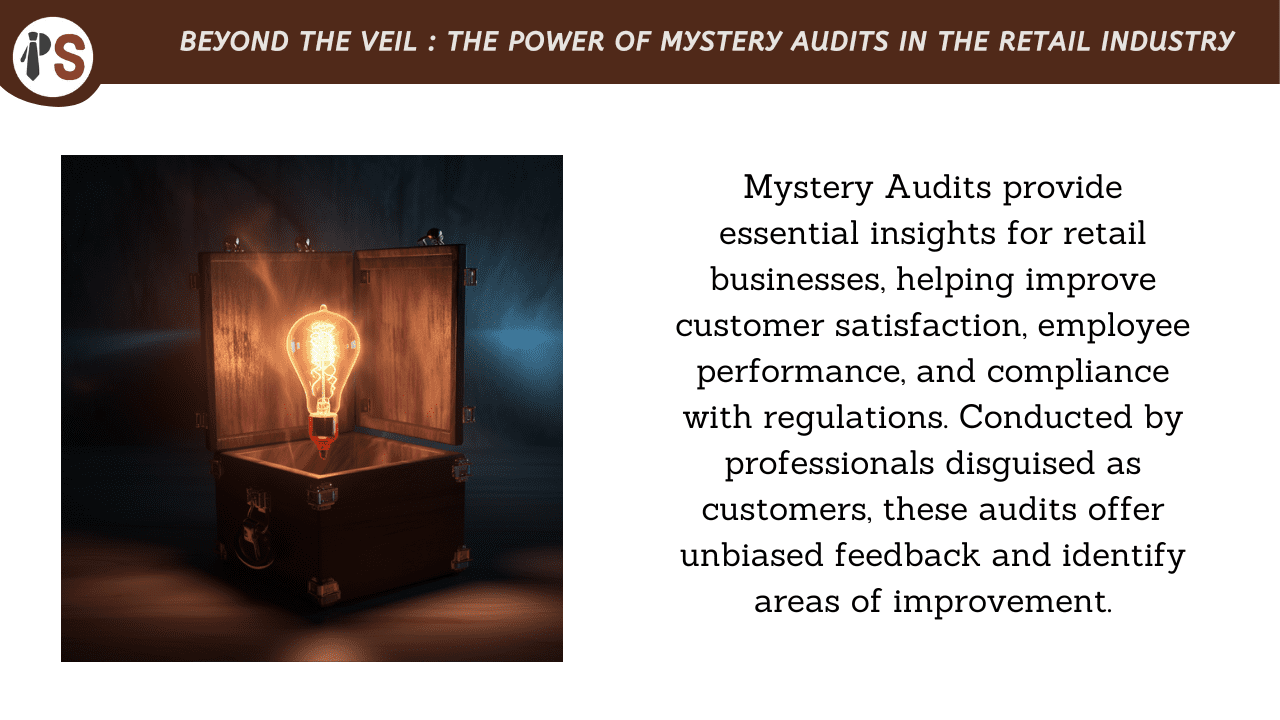
Ever heard of "mystery shoppers" or a "mystery audit?" It's not as clandestine as it sounds, but it's a critical strategy to improve customer satisfaction and elevate business performance in the retail industry. This article explores the enigma of the mystery audit in the retail industry. Let's embark on a journey of discovery together, shall we?
In essence, a mystery audit is like a reality check for a business. This quality assurance tool involves individuals disguised as regular customers who evaluate the services of a store or company. Their mission? To assess customer service, product quality, store environment, and compliance with regulations - a pretty important gig, wouldn't you say?
Just picture this – you're running a retail store. You've got everything from top-notch merchandise to a killer marketing strategy, but you're still missing a vital piece of the puzzle – customer feedback. That's where mystery audits step in. By providing firsthand, unbiased insights, they help pinpoint areas of improvement that might have slipped through the cracks.
A mystery audit is more than just shopping – it's an art. It involves meticulous planning, execution, and analysis. The auditor, often called a mystery shopper, makes a purchase, observes the environment, and interacts with the employees. Post-visit, the auditor prepares a detailed report which then serves as a mirror for the company to reflect on its operational strengths and weaknesses.
Customer satisfaction is the holy grail of retail, isn't it? A well-executed mystery audit can help you keep your finger on the pulse of customer sentiment. It identifies the gaps in customer service, product availability, and overall store experience. By addressing these, businesses can bolster their customer satisfaction score, and let's be honest, who wouldn't want that?
Now, this is where it gets interesting. By providing real-time feedback on employee performance, mystery audits can be a potent tool for staff development. They help identify training needs, reinforce positive behavior, and discourage misconduct. If you ask me, it's a win-win situation for the employees and the business alike!
Staying on the right side of rules and regulations – it's not just about avoiding penalties, it's also about maintaining brand reputation. Mystery audits play a crucial role in ensuring regulatory compliance. The audits help monitor adherence to regulations on safety, cleanliness, pricing, and more, thus maintaining the brand's integrity.
Now, you're probably wondering - what about e-commerce? Well, the mystery audit has evolved with the digital age too! In the e-commerce sector, auditors evaluate website navigation, response time, payment process, product delivery, and return procedures. Just because it's virtual doesn't mean it's any less important!
Every coin has two sides, and mystery audits are no exception. While they offer invaluable insights and facilitate improvements, they also have potential drawbacks such as bias and limited scope. However, when conducted professionally and used in conjunction with other tools, the pros certainly outweigh the cons.
If done right, mystery audits can be a game-changer. Here are a few tips for conducting effective audits:
Clear Objectives: Know what you're looking for. Establish clear objectives before the audit to ensure useful insights.
Detailed Reporting: "The devil is in the details," they say. Ensure the mystery shopper provides a comprehensive report capturing all aspects of the experience.
Regular Audits: Conduct audits regularly for consistent feedback and improvement.
Professional Auditors: Engage professional auditors who understand the nuances of the task.
In this world of ever-increasing options, picking the right mystery audit partner might seem like finding a needle in a haystack. Look for experienced partners who provide comprehensive services, have a proven track record, and most importantly, align with your business goals.
Technology is shaking up the world, and the realm of mystery audits is no exception. Expect a future where digital tools, AI, and data analytics will be integral to audits, making them more effective and precise. Now, that's something to look forward to, isn't it?
There's no one-size-fits-all answer to this. It depends on the business size, industry, and specific objectives. However, most experts recommend at least quarterly audits for effective results.
Professional auditing companies usually conduct mystery audits. These firms employ individuals trained to act as typical customers and objectively assess a business.
Yes, it is perfectly legal to conduct mystery audits as long as the process respects privacy laws and other regulations.
Mystery audits typically cover customer service, product quality, store cleanliness, regulatory compliance, and overall customer experience.
Absolutely! For e-commerce businesses, mystery audits cover website usability, response time, payment process, delivery, and return procedures.
While mystery audits provide invaluable insights, they can sometimes suffer from subjectivity and limited scope. However, when used alongside other tools, they prove highly beneficial.
Mystery audits may sound covert, but their impact on the retail industry is decidedly clear. They serve as a compass, guiding businesses towards enhanced customer satisfaction, improved employee performance, and strict regulatory compliance. Whether it's a brick-and-mortar store or an online retail giant, the mystery audit has firmly established its relevance and necessity.
At Professional Saathi, we offer a range of business consultancy services that help businesses improve their performance, achieve growth, and overcome challenges.
Copyright 2026 © Created By KTPG PROFESSIONAL SAATHI CORPORATE CONSULTANT PRIVATE LIMITED, All Rights Reserved.
Leave Your Comment